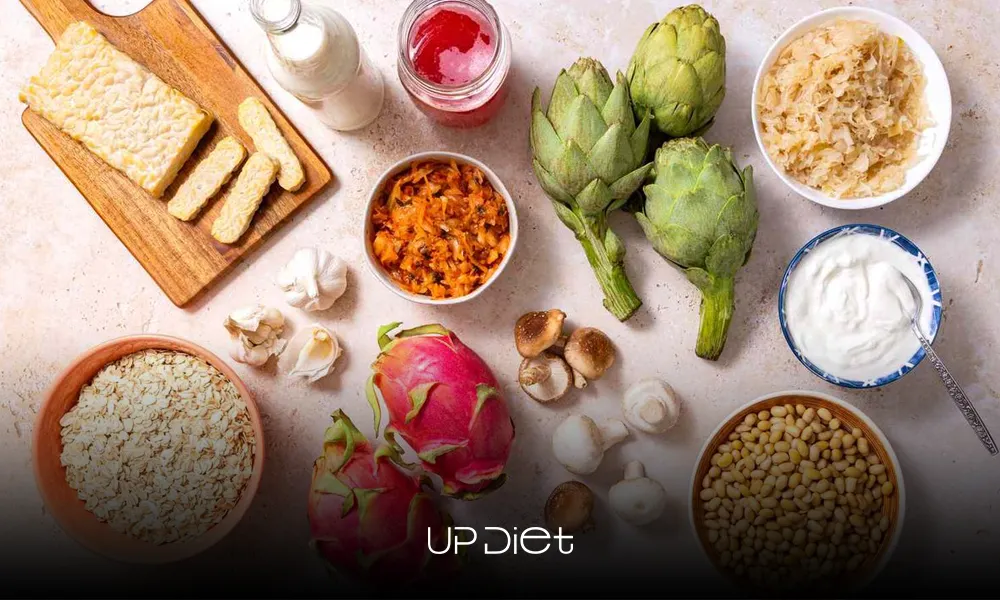Get a plan made for your unique body and goals
Your Blueprint for Wellness: The Diet and Gut Microbiome Connection

Your gut impacts almost every aspect of your health. From digestion to GI conditions, sleep, mental health, immune system, endocrine disorders … the list goes on. In fact, it is your gut microbiome and nutrition, because food is by far the simplest and most effective tool to have a healthy gut.
Let’s discover how nutrition shapes your gut and your overall well-being.
Understanding the Gut Microbiome
Your gut microbiome is an active community of roughly 100 trillion microbes in your digestive tract, which is 10 times more than your body’s cells combined.

These +5,000 species of bacteria, archaea, fungi, and viruses that digest food, create energy-boosting nutrients, strengthen immunity, protect against harmful bacteria, and control how your body processes sugar and fat.
The Link Between Gut Microbiome and Nutrition
Your gut microbes and diet are closely connected; what you eat directly influences this bustling ecosystem. For instance:
- Dietary changes alter your microbiome in a short time. A Stanford team found that a 10-week diet high in fermented foods boosts the diversity and immunity of microbes. Diets rich in plant-based foods also increase the presence of microbes that reduce the risk of common illnesses, such as heart disease.
- Healthy, plant-based foods influence your microbiome composition, which is linked to various health issues. Some microbe communities reduce the chance of CVDs, type 2 diabetes, obesity, and inflammation, while their imbalance triggers chronic illnesses.
- Specific nutrients strongly support your microbiome. For example, fiber helps microbes lower the risk of inflammatory diseases. Magnesium supplements also help boost gut bacteria and vitamin D levels, which in turn protect against colorectal cancer.
How Gut Microbes and Diet Influence Your Health
As the link between the gut microbes and diet shows, what you eat can either nurture or disrupt the delicate balance of microbes. When the right balance of gut bacteria is maintained, you’ll experience the following positive outcomes:
- Improved digestion: You’ll break down food and absorb nutrients more efficiently.
- Increased energy: You’ll have consistent energy throughout the day due to optimized energy extraction from food.
- Reduced inflammation: Your immune system functions better and lowers the risk of inflammatory diseases.
- Weight balance: You’ll have a more regulated metabolism and fat storage.
- Mood regulation: You’ll experience better mental health because of stronger gut-brain communication.
Best Diet for a Healthy Gut Microbiome
To cultivate a robust gut microbiome, focus on a diverse range of healthy, fresh, and fiber-rich foods.

Introduce plant-based options like fruits, vegetables, whole grains, legumes, nuts, and seeds for your prebiotics, along with fermented foods like yogurt, kefir, kimchi, sauerkraut, etc., for probiotics. The best diet for the gut microbiome also includes healthy, plant-based fats from sources such as olive oil, avocado, and nuts.
Suppose you’re having a difficult time incorporating all these tips into your daily life. In that case, UpDiet helps you achieve health goals naturally. How? By turning your gut data into innovative meal plans, recipes, and more that evolve with your lifestyle. Read more about available plans on the home page.
Foods to Avoid for Gut Health
Some foods disrupt the gut microbiome by starving the good bacteria while feeding the bad ones. If you want to pay more attention to your gut microbes and diet, be mindful of overeating these foods:
- Processed and ultra-processed foods
- Refined sugar
- Sugar substitutes
- Refined grains
- Unhealthy, saturated fats
- Alcohol
- Caffeine
- Foods that are considered natural antibiotics
Note! Depending on your unique gut flora, it may be better to avoid dairy products, gluten, or certain fruits as well.
Simple Steps to Improve Your Gut Microbiome Through Diet
- Eat more fiber
- Include fermented foods packed with probiotics
- Stay hydrated
- Enjoy a varied diet and a diverse range of foods
- Manage your stress
- Consume alcohol in moderation
- Limit smoking
- Exercise regularly
- Improve the quality of your sleep
Final Thoughts: Build a Sustainable Gut-Friendly Diet
Your gut thrives on healthy eating, but it’s also dependent on being consistent. Remember that the best diet for the gut microbiome is one you can maintain. Choose whole, nourishing foods you enjoy, and let consistency (not perfection) be your guide to long-term gut health.
- In this post:
- Understanding the Gut Microbiome
- The Link Between Gut Microbiome and Nutrition
- How Gut Microbes and Diet Influence Your Health
- Best Diet for a Healthy Gut Microbiome
- Foods to Avoid for Gut Health
- Simple Steps to Improve Your Gut Microbiome Through Diet
- Final Thoughts: Build a Sustainable Gut-Friendly Diet



